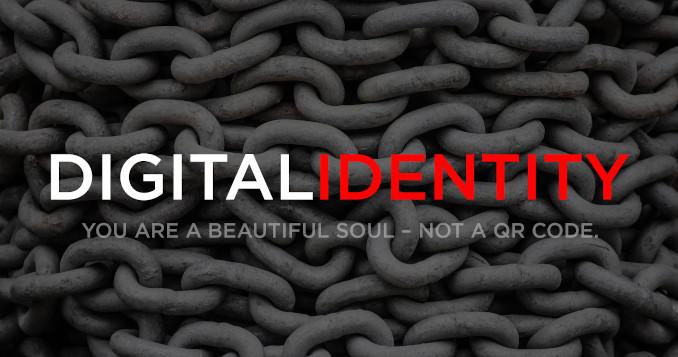The Global Landscape on Vaccine ID Passports Part 3:
The Key Implementers of Your Digital Identity onto The Blockchain
By Corey Lynn of Corey’s Digs
The goal of coercing the world’s population into obtaining a Digital ID is one with many arms, expanding the field of players and implementers to a degree that would take a year to trace down. Yet, the key implementers who are steering and/or directly overseeing many of the smaller outfits tend to stand out due to their connections, funding, and girth of power. This report breaks down some of those bigger implementers that are at the top of the food chain, gobbling up everyone’s data, and building the framework to roll up all human beings into a Digital Identity and put them on the Blockchain. According to ResearchAndMarkets, the post-Covid-19 identity verification market is forecasted to grow from $7.6 billion in 2020 to $15.8 billion by 2025. And according to the UN, artificial intelligence (AI) is forecasted to generate nearly $4 trillion in “added value” for global markets by 2022. As with all of their manufactured crisis industries, the manufacturers stand to make trillions, and their new industry is human enslavement.
Part 2 broke down the who, what, when, where, why, and how they have been building toward this for a very long time. It is important to review Parts 1 and 2 before reading Part 3, for a comprehensive outline of what’s truly transpiring. They want full surveillance, control over all human beings and resources, and world domination. It’s critical to understand the various mechanisms being used to enslave humanity, who’s behind it, and what their ultimate end game is, so that one can make educated decisions, stay ahead of the game as much as possible, better protect oneself, and collaborate to navigate this corrupt territory and establish ways to combat it. As stated in Part 2, “Don’t become a QR code.”
As they work tirelessly at corralling all children and adults to sign up for a vaccine ID passport and get a digital identity with a simple QR code that will link to one’s data, they are also making certain that all newborns will be brought directly into the system from birth, for a seamless transition into their new world order. In 2019, NEC (Nippon Electric Company) carried out the world’s first proof of concept of fingerprint identification of newborns in the Republic of Kenya, with great excitement at being a part of the UN 2030 Agenda’s Goal 16, Target 16.9, which requires that states should, “by 2030, provide legal identity for all, including birth registration.” This goes hand in hand with ID2020’s charge to develop a “persistent digital identity from birth,” with “cutting-edge infant biometric technologies.”
The telecommunications industry plays a vital role in the digital identity infrastructure, being that smartphones are the prime device being used in most cases. In 2018, AT&T, T-Mobile, Sprint, and Verizon increased their authentication process, which also included fingerprint biometrics, which many phones are using these days. The CEO of AT&T Business was recently a keynote speaker discussing the “rise of digital identity” at The Economist Event Series. According to analysts at Juniper Research, biometrics capabilities—including fingerprint, iris, and voice recognition—will reach 95% of smartphones globally by 2025, accounting for $3 trillion in payment transactions, up from $404 billion in 2020.
The so-called pandemic, BlackRock’s “Going Direct” plan that instituted a financial takeover, and the digital identity agenda are all a coordinated attack against humanity to bring in the Fourth Industrial Revolution, which, by design, is intended to plug every human being into the smart grid, inside their smart cities. There, a virtual and augmented reality awaits, all data are mined and surveilled, people become a labor force synced with robots, and a social and climate scoring system controls everybody’s actions, access, and spending. Yes, it sounds very dystopian, once the masterful marketing spin is removed from the content to reveal the true context.
While reading this report, keep the following key points in mind. What can people do to stop this from moving forward?

- Do not be coerced, bribed, blackmailed, shamed, guilted, manipulated, or intimidated into complying.
- Avoid at all cost vaccine ID passports and digital identities being pushed by banks, driver’s license facilities, and other industries as a means for “access” or “convenience.”
- Make everyone you know aware of what this push for a QR code and digital identity is really about, and how they intend to put you on the Blockchain to surveil and control your every move.
- Bringing this information to the attention of your legislatures and demanding legislation to block vaccine ID passports and digital identity applications is critical. See Part 1 for a list of states that have already taken action on this front.
- Remove your money from the large banks into smaller, family-owned banks and small credit unions. If 10% of people did this, it would create a huge shift.
- Build your own family or community energy and food systems. Resilient energy and food supplies will go a long way in protecting against their digital financial blackmailing systems.
- Stop feeding the beast—do not spend money at Amazon (here’s why) and big box stores that are building the infrastructure to enslave humanity. Here are some alternative options.
- Cash is king. Use cash as often as possible to avoid the hyper-tracking taking place inside bank accounts that are aggregating your data and building your social and climate score, as well as studying spending behaviors of the masses to manipulate industries, supply chains, and markets.
- Purchasing any product with the word “smart” in it isn’t so smart. These products are all used for surveillance purposes via audio, some visual, and data aggregation, not to mention potential integrated mind control technologies. Here is a checklist of tips for how to better protect yourself when it comes to technology.
- Clear as many debts as you are able to so you are beholden to no one. Invest in people, learning trade skills, family and community, hard assets, proper schooling for your children (which might mean a local homeschool network), local farmers, any necessary supplies or equipment you feel you need, and your health and peace of mind.
- If your place of employment is requiring you to get the Covid injection, here are some resources, assistance, and a downloadable form to provide to your employer. If they will not accept a religious or medical exemption and leave you with no option, let them fire you instead of quitting, so you have recourse.
- While the injection is still under Emergency Use Authorization, it is not legal to require a person to get it, and “informed consent” is the law. Though the FDA stated it intended to “sprint” to get the full approval done for Pfizer, the application was just submitted on May 7, 2021, and a “typical review of an application like Pfizer’s takes 10 months,” according to Stat, which communicated directly with the FDA regarding its “sprint.” FDA’s statement was the original source of the media frenzy stating that the Pfizer injection would be approved in September, followed by Biden demanding it be approved by Labor Day, all of which was intended to increase the urgency for businesses to mandate the injections BEFORE their approval. Pay attention to the FDA, not the media, and stick with “informed consent” for now. Maybe the FDA will move at lightening pace, or maybe not.
- Visualize a better future for all, where these corrupt individuals are stopped in their tracks, and Pray.
If just 10% of the US population stuck to this list of bullet points above – we could forever shift the trajectory of their agenda and potentially put a halt to it.
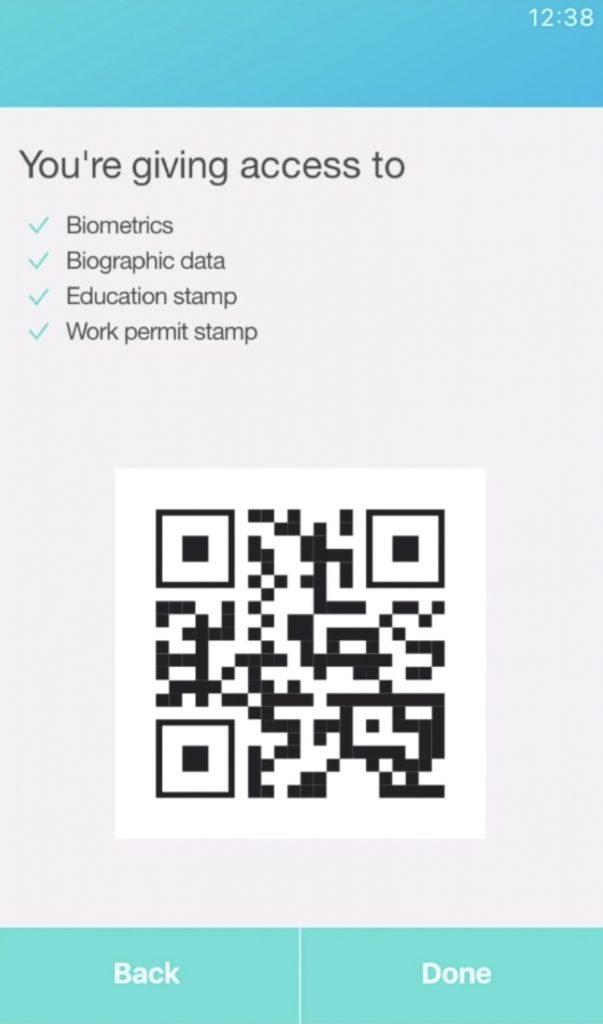
“What is Digital Identity? Who a person or organization fundamentally is – a combination of attributes, beliefs, personal/organizational history and behavior that together constitute a holistic definition of the individual or organization self.” ~ World Economic Forum, January 2020
PLUS health records, financial information, education, demographic locations, shopping and spending habits, social media behavior, your choices, what you eat, and more.
The World Economic Forum’s report titled “Identity in a Digital World: A new chapter in the social contract,” illustrates (page 10, Figure 1) what the digital identity will look like in our everyday lives. Corey’s Digs has reproduced this chart below to avoid the Forum’s stringent copyright issues, which make it quite apparent that they absolutely do not want this information circulated, despite their insistence that they are creating this for the betterment of humanity, while building a “social contract” FOR you.
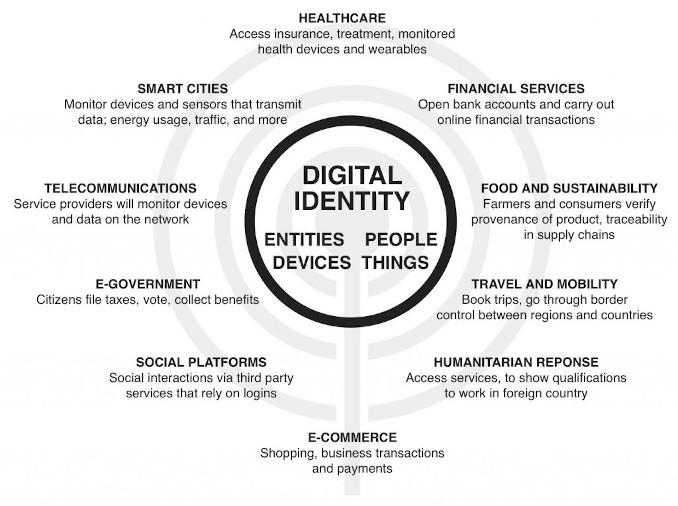
This is one of their visual schematics of a surveillance system on human beings. While they use the words “convenience, inclusive, and security” (and people fall for it), trust your eyes. It is exactly what they are showing you, not what they are telling you.
The Masters of Marketing Deception
Plain and simple – they are masters of marketing. They share just enough information to get people on board and entice them with promises of convenience, safety, protection, and how everyone will be saving the world by doing the right thing. The easiest way to read between the lines and discern what these folks are really up to is to split their marketing content in the following way:
1) They will always utilize four main topics to push all of their agendas to the finish line: the climate hoax, the virus, cyber attacks, and terrorist threats. They will use intimidation, guilt, shame, and fear tactics. Don’t buy into it. They manufacture the disaster, then swoop in with the solution, which is always 100% to their benefit and at your expense.
2) All of the points they make that serve stakeholders, government, and the private and public sectors convey truthful information, though they leave out the incredible amount of money and power they will derive from such efforts.
3) All of the points they make about transparency, privacy, protection, safety, benefits, and convenience for individual citizens are a lie. They are doing the exact opposite. That’s the spin, so it’s quite easy to spot.
The Evidence Is in Their White Papers
“Seamless verification of people and connected devices is essential to delivering individualized and integrated services in smart cities.” ~ World Economic Forum, 2020
Through the vaccine ID passports, QR digital identity, biometrics, smart devices and wearables, IoT, Real ID Act, Government Identity Act (trying to pass) and other legislation, telecommunications monitoring, big tech, lidar and satellites, DARPA and ARPA-H/HARPA, DNA databases, AI integration, ID.me used by 20 states with digital biometric identity for unemployment benefits, and Blockchain, there is an unprecedented level of spying and surveillance taking place in this country and around the globe. Anyone denying it at this point in the game is either extremely foolish and naive or working against humanity.
World Economic Forum’s “Reimagining Digital Identity: A Strategic Imperative“ (January 2020)
The Cliff Notes:
- Pg 4: A digital identity is “who a person or organization fundamentally is – a combination of attributes, beliefs, personal/organizational history and behavior that together constitute a holistic definition of the individual or organizational self.“
- Pg 7: “Seamless verification of people and connected devices is essential to delivering individualized and integrated services in smart cities.”
- Pg 8: “Governments will be able to leverage trusted traveller identity as a starting point for redeploying it for access to other services in other sectors.“
- Pg 9: How can digital identity generate value in the health care system? According to McKinsey, “savings from seamless and secure sharing of medical information could equal 50% of US GDP.”
- Pg 13: This sentence is a prime example of what something written by masters of marketing through deception looks like. They nailed every buzzword in this single sentence, and the only words that bear truth are “digital identity”: “Solutions that support digital identity that are fit for purpose, inclusive, useful, secure and founded on offering user choice will benefit individuals as consumers by providing them with convenience, privacy, inclusion, security, agency and autonomy in all kinds of their online transactions.”
- Pg 16: Businesses are to manage both customers and workforce identities and data across silos, and are to “adjust their operations across sectors to leverage networked digital identity.“
- Pg 17: This page presents a “design framework” that illustrates how to create value for governments, businesses, and individuals, while emphasizing the need for a “shared ecosystem.”
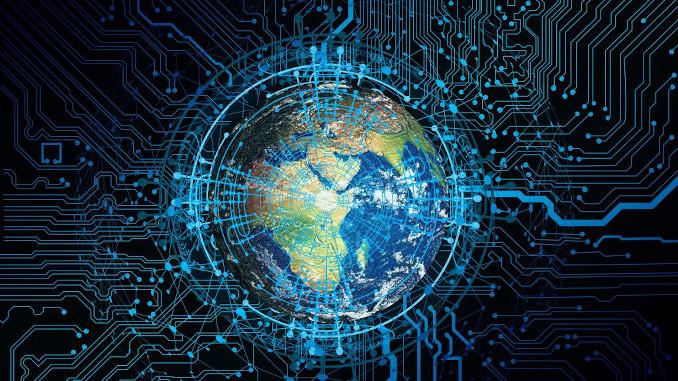
United Nations Report of the Secretary-General: ‘Roadmap for Digital Cooperation‘ (June 2020)
In July 2018, the Secretary-General convened a “high-level panel on Digital Cooperation” of 20 independent experts, co-chaired by Melinda Gates and Jack Ma, to advance their agenda, which resulted in producing a report titled “The Age of Digital Interdependence” in June 2019. The report states, “The immense power and value of data in the modern economy can and must be harnessed to meet the SDGs (UN sustainable development goals), but this will require new models of collaboration.” Following the release of that report, all member states and over 300 entities and organizations were contacted. Their input contributed to this report.
Who were the “independent experts” who convened to provide these recommendations? As listed on pages 27-33, attendees represented multiple governments and the International Trade Center, International Telecommunication Union, European Union, Alibaba, Cisco, Facebook, Ford Foundation, Ethereum, Gates Foundation, Google, Global Compact, GSMA, Mastercard, Microsoft, Lemann Foundation, World Economic Forum (WEF), several UN arms, World Bank, World Food Programme (WFP), World Health Organization, and numerous others.
The Cliff Notes:
- Pg 2: “By harnessing them (technology) appropriately, the digital revolution can be steered to combat climate change and advance global sustainability, environmental stewardship and human well-being.”
- Pg 7: They want to connect every school in the world to the Internet.
- Pg 10 from ‘The Age of Digital Interdependence’: “McKinsey & Company studied seven large countries and concluded that digital ID systems could add between 3 and 13% to their gross domestic product.”
- Pg 11: They don’t feel enough women are on the Internet. They believe there is a “gender gap,” and they want everyone plugged in.
- Pg 15: They use hacking and espionage as reasons to create this new system that will allegedly protect “human rights,” while suggesting that 7.9 billion people need to be plugged in with digital identities—based on 1 billion individuals who lack identification and may not have access to the same services—rather than just building that system for those individuals. This decades-old strategy is similar to converting school bathrooms to unisex for one transgender person who attends the school.
- Pg 16: Under the guise of “inequalities” on social media, because women and girls are 27 times more likely to be harassed, the LGBTQ community has been threatened, and environmentalists and journalists have taken heat, they are advocating for “content governance frameworks” by Member States and businesses.
- Pg 17: Artificial Intelligence (AI) is forecasted to generate nearly $4 trillion in “added value” for global markets by 2022.
- Pg 20: This sums it up well, when replacing the word “safeguarded” with “controlled”: “The digital technologies that underpin core societal functions, often referred to as critical infrastructure, including supporting access to food, water, housing, energy, health care and transportation, need to be safeguarded.”
- Pg 22: The UN will serve as a platform for multi-stakeholder policy dialogue to accelerate global digital cooperation.
See the World Bank’s “Identification for Development (ID4D)” initiative for more information on this agenda; partners include the Bill & Melinda Gates Foundation, UKaid, Australian Aid, Omidyar Network, Center for Global Development, European Commission, GSMA, UNICEF, UN Refugee Agency (UNHCR), International Organization for Migration (IOM), UN Development Programme (UNDP), WEF, and WFP.
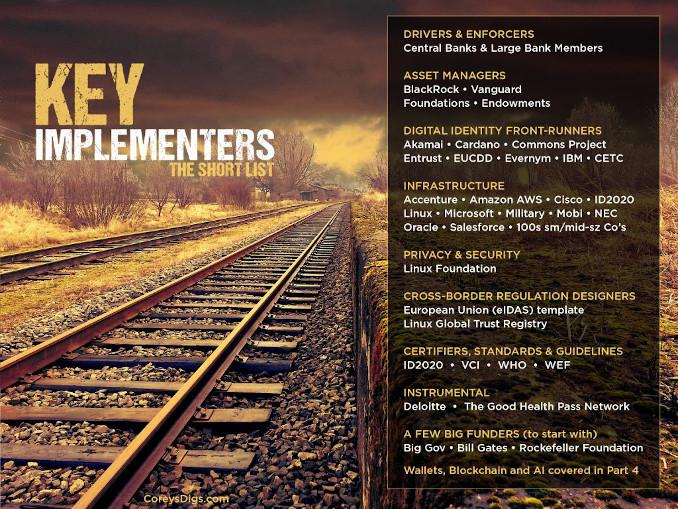
The Key Implementers
There are hundreds of companies involved in this scheme, many of which are small potatoes hoping to hit the big time, but many are instrumental players who are just a tier or two down from the big guys calling the shots. This section exposes some of the higher-level implementers.
It’s so important to understand that many of the key implementers are also involved with BlackRock’s Going Direct scheme that carried out the greatest transfer of wealth ever seen in history, and are heavily involved with the Covid agenda and profiting from the injections. It’s the oldest marketing trick in the book—manufacture a need and provide a solution. The only one who wins is the Eskimo who sold you the ice. It should also be noted that many of the same players involved with the pandemic, digital identities, and the financial takeover also fund the CDC Foundation.
Central Bankers and Investment Firms
“We want everyone to thrive in the digital world – no one should be left behind. That means educating everyone on how to keep themselves and their data safe online, which is something that we at Barclays are very passionate about. But it also means ensuring universal access to a safe, secure and easy to use digital identity, so that everyone can confidently unlock the benefits of the digital economy.” – Jes Staley, Barclays Group Chief Executive Officer, Barclays
“It’s important to realize that net zero demands a transformation of the entire economy.” – Larry Fink, Chief Executive Officer, BlackRock
To understand the depth of just how involved the Central Banks and investment firms are in this “transformation,” it’s critical to watch this video with John Titus explaining the “Going Direct” reset that BlackRock implemented to create the greatest transfer of wealth in the history of the world. The so-called pandemic, Going Direct financial takeover, the banks‘ involvement with rolling out digital identities and social and climate score systems, and the UN’s 2030 Agenda are all connected. Read Titus’ brilliant timeline to see how quickly and efficiently they rolled this all out.
Multiple layers of this agenda are all colliding right now, and you can bet that the bankers and investors are pulling the strings. They want everyone working remotely, telemedicine in full force, and a breakdown of the school system to force virtual schooling. Why? Because they want everyone plugged in. They want to extend the renter moratorium to put landlords out of business so they can scoop up their property. They’ve manufactured inflation of the housing market, making it difficult for people to buy or build a home, for the same reason. This also increases home values, creating higher property taxes, which go directly into building up their smart cities. States have been rolling out additional taxes on vacation rental homes, airlines, car rentals, vaping products, and other items and services as well. They continue to extend the unemployment benefits while thousands of businesses are desperate to hire people before having to close their doors for good. All of this is to bring about poverty across the board—except for the “rich elite,” of course. It doesn’t take a genius to see their plan, and everyone’s eyes should be wide open by now.

World Economic Forum:
‘A Blueprint for Digital Identity: The Role of Financial Institutions in Building The Digital Identity‘
This report was part of the Future of Financial Services Series, prepared in collaboration with Deloitte in August 2016 “to provide clarity and direction around the structure of identity and provide a call to action for Financial Institutions to move against the identity challenge.”
Multi-stakeholder workshops and interviews with “industry experts” were conducted over a 12-month period to create this masterpiece. Some of the stakeholders are Morgan Stanley, Bill & Melinda Gates Foundation, JPMorgan Chase, Deloitte, Barclays, Visa, Mastercard, Deutsche Bank, Lloyds Bank, Standard Chartered, Zurich, and many more.
The Cliff Notes:
- Pg 23: “Financial Institutions are well positioned to drive the creation of digital identity systems.”
- Pg 24: “Financial Institutions could derive substantial benefit from investing in the development of digital identity solutions,” promising them new revenue opportunities and “transformational future state opportunities.”
- Pg 26: “Offer new products or services based on increased knowledge of customers,” such as financial advisory, “new insurance products on fractionally owned assets and behavior-based insurance.”
- Pg 27: Disruption of the credit bureau model, and assisting with decisions and “blurring the lines between financial and non-financial advisory.”
- Pg 27: “Become the trusted identity provider of the public sector, assisting with social services and civic requirements such as tax filing.“
- Pg 28: Legal and regulatory acceptance for using third‐party verified information, attribute exchange and external use of user information.
- Pg 36: Financial institutions will offer identity as a service (in the beginning), regulators will have increased access to up-to-date information, and governments can “more easily and effectively deliver public services.”
- Pg 37: “Distributed Ledger Technology (Blockchain) combined with encryption and cloud storage allows information to be held and transferred point-to-point in a dispersed, immutable network.”
- Pg 37: “Biometrics, including fingerprint, retina scanning, heartbeat waveform and facial recognition based on mobile devices have potential to provide greater convenience and security and are being integrated into many anti-fraud controls.”
- Pg 41: “Identity is a collection of pieces of information that describe an entity,” such as; age, height, date of birth, fingerprints, health records, preferences and behaviors, telephone metadata, national identifier number, telephone number, and email address, for starters.
- Pg 47: “The governance body provides oversight for the system and owns the operating standards and requirements”.
- Pg 60: Blockchain, or distributed ledger technology (DLT) “has potential in identity applications as an information storage and transfer mechanism within different archetypes. DLT could be applied as a distributed protocol, giving users the ability to store their identity attestations on a ledger and expose them to different RPs, or in a centralized system where the ledger would be owned by a single entity that would provide a consolidated view of the users’ attestations for use in transactions, but would not reveal the nature of the credentials.”
- Pg 68: Since financial institutions have a large number of users, they “have a key role to play in ensuring that identity systems are a tool to increase financial inclusion,” and be a “catalyst in driving system adoption and uptake.“
- Pg 95: New capabilities for financial institutions via digital identities would include: digital identity attributes tied to payment tokens, digital tax filing, and tracking total asset rehypothecation.
- Pg 97: “In collaboration with governments, taxes could be automatically completed and filings generated by customers’ chosen Financial Institution, using their complete knowledge of customers’ financial holdings, assets, income and personal circumstances.”
“To truly make the digital world work for all, we must rethink traditional notions of digital identity and break down artificial barriers. We need a new model that starts with the commitment to the fundamental individual right – “I own my identity and I control my identity data.” And we need businesses, governments, NGOs and others to forge partnerships and invest resources in support of a common framework, principles and standards.” – Ajay Bhalla, President, Cyber & Intelligence, Mastercard
The Catalysts and Certifiers of The Digital Identity
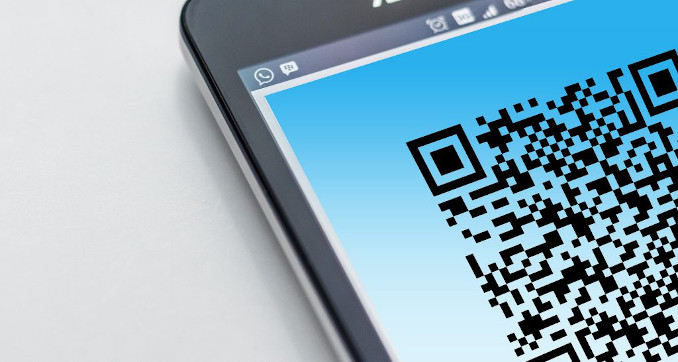
“A lot of our time is spent with central bankers and making sure they see what the pioneers have done. We think over the next five years, most of the central banks will say okay, they can do this, because most of the building blocks are accessible and there’s almost a straightforward way that they can get their citizens all connected up.” – Bill Gates stated at the 2020 Singapore FinTech Festival in regards to getting two-thirds of the world hooked into digital identities for “financial inclusion”
ID2020, a public-private partnership operating as a 501(c)(3), was launched in 2016 by founders Gavi, Microsoft, The Rockefeller Foundation, Accenture, and IDEO.org. In May 2016, they met with over 400 people and experts in technology at the United Nations Headquarters in New York to discuss how they planned to create a digital identity for everyone in the world, under the United Nations 2030 Sustainable Development agenda. In addition to the founding partners, they also boast 19 general partners. The irony, as always, is that they promote it by stating that there are “1.1 billion people worldwide living without a digital identity” who are suffering because of it, and therefore the partnership is “advocating for ethical, privacy-protecting approaches to digital ID”—FOR THE ENTIRE WORLD.
ID2020 is involved with countless collaborations, initiatives, and programs. One example of a local-level collaboration is with the City of Austin on MyPass, which is a blockchain-enabled digital identity platform for homeless people, along with the Austin Blockchain Collective, Dell Medical School and the National Innovation Service. The project is funded by a grant from the Robert Wood Johnson Foundation.
In January 2019, ID2020 deemed itself “the world’s leading digital ID organization” and certifying body for digital credentials, by launching its new certification mark.
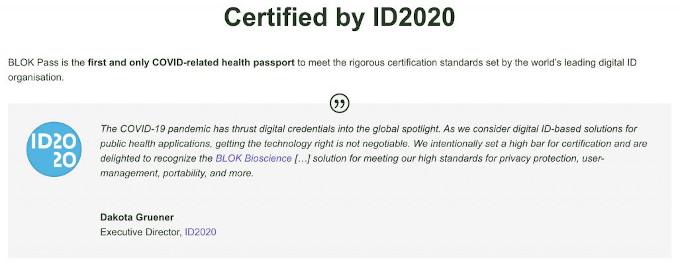
On October 18, 2019, just three months before the so-called pandemic was announced as hitting the U.S., the Johns Hopkins Center for Health Security, World Economic Forum (WEF), and the Bill & Melinda Gates Foundation hosted Event 201, a “high-level” pandemic exercise, in New York, NY.
The Bill & Melinda Gates Foundation is the sole “strategic foundation partner” of the WEF, while Microsoft is a “strategic partner,” and IDEO is a general partnership.
On July 15, 2021, the Surgeon General announced that the Rockefeller Foundation is committing $13.5 million in funding to strengthen public health response efforts in the U.S., Africa, India, and Latin America by countering “health mis- and disinformation-confusing, inaccurate, and harmful information,” which will include “data-driven public health interventions to meet the unique challenges of today’s media environment.” In other words, they are paying to control the narrative so that their investment in ID2020 succeeds. Under normal circumstances this would be seen as a huge conflict of interest, but the increasing dictatorship is anything but normal.
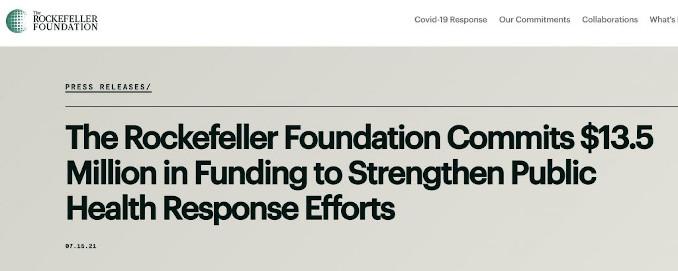
Rockefeller has always been a big funder of Gavi, making a $5 million donation in 2020, followed up by another $2.1 million in 2021. Bill Gates likes to return the favor and send the money back on through to the Rockefellers. The Bill & Melinda Gates Foundation has committed over 70 large grants to Rockefeller University and Rockefeller Philanthropy Advisors since 2006, with a whopping $27 million to Rockefeller Philanthropy Advisors in 2020 alone.
The Rockefeller Foundation also awarded $1 million in 2018 and over $3.8 million in 2019 to Accenture, most likely for their work with ID2020, based on their 990s.
We are on the threshold of a new model of digital identity that expands beyond individuals to organizations, ‘things,’ devices and places. It will provide the foundation by which our digital selves will interact with online systems, control our connected devices, leverage the learnings of applied intelligence and protect the earth’s resources. Getting this right is critical to our future growth, responsibly harnessing technology innovation and enabling a better, more responsible digital life.
~ Paul Daugherty, Chief Technology and Innovation Officer, Accenture
Accenture, a key partner of ID2020, was originally established in 1989 as Andersen Consulting, and changed its name to Accenture in 2001 after severing ties from its parent company Arthur Andersen. They went public on the NYSE in April, 2001. Headquartered in Dublin, Ireland, they have offices in 51 countries. Their focus is management consulting, technology, supply chain management, financial services, and business strategy, and they pulled in revenues of over $44 billion in 2020.
Accenture’s work with ID2020 uses their “unique identity service platform to deploy a breakthrough biometrics system that can manage fingerprints, iris scans and other data,” that incorporates with Blockchain. Check out how it works here.
Accenture has been gobbling up companies for quite some time, amassing over 200. Here is a short list of some of the most recent companies. They’ve been working side by side with Amazon’s AWS and Google for years.
In December 2011, Accenture Federal Services (AFS), a subsidiary of Accenture, was awarded a $71 million contract with the U.S. Department of Homeland Security to enhance the capabilities of its immigration and border management functions, by increasing the number and types of biometrics used in identification.
In 2014, AFS was awarded a $563 million five-year contract by the U.S. Department of Defense to provide software development and ongoing tech support to HeathCare.gov, after replacing CGI as the lead contractor. HealthCare.gov is quite a robust database loaded with personal and health-related information on individuals.
In June 2020, AFS won a $341 million contract to help the Department of Commerce modernize and consolidate its business systems and data platform.
In September 2020, Accenture committed $3 billion to create their new division called Accenture Cloud First.
On June 18, 2021, AFS was given a $112 million prime task order by the Department of Homeland Security’s Cybersecurity and Infrastructure Agency to protect federal civilian executive branch systems against cyberattacks, and Cloudfare is partnering with them for this task.
On July 27, 2021, AFS won a $729 million contract to help the U.S. Army Communications-Electronics Command (CECOM) consolidate multiple enterprise resource planning (ERP) systems.
These are just a handful of contracts that Accenture has won with the U.S. Government. They go way back. And, as with all “key companies,” Vanguard and BlackRock are the top two shareholders.
Who’s IDEO.org?
IDEO.org is a non-profit design studio spun off from its parent company IDEO, which was founded in 1991, with offices in the U.S., England, Germany, Japan, and China. They “design products and services alongside organizations that are committed to creating a more just and inclusive world,” and are funded by none other than the Bill & Melinda Gates Foundation, Rockefeller Foundation, Bezos Family Foundation, JPMorgan Chase, David and Lucile Packard Foundation, UK Department for International Development, and a couple dozen other generous donors. They recently went to Tanzania to study how the ID registration process rolled out there, so they can come up with solutions for the digital identity process.
The Good Health Pass Collaborative Network
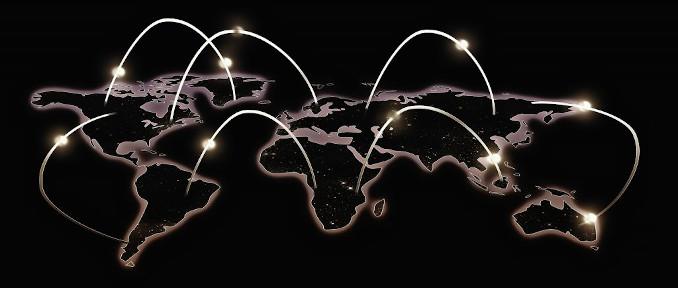
In February 2020, ID2020 launched the Good Health Pass Collaborative (GHPC). They call it a cross-sector initiative to create a blueprint for interoperable health pass systems. Some of the biggest ID apps being utilized in various countries are all part of THIS NETWORK, and the tech companies implementing the infrastructure to get everyone’s data from the QR codes onto the Blockchain are also part of this network, in addition to some of the payment systems. The network encompasses the UK Entrust app, the CommonPass in the EU, IBM’s Excelsior Pass in New York, NEC’s biometric fingerprinting, Linux’s Hyperledger Blockchain technology and Covid-19 Credentials Initiative, Salesforce, Mastercard, and dozens of others.
There are 128 partners in this network, and they have created a “white paper” consisting of “principles” with which organizations must be aligned in order to “provide the structure and coherence necessary for these ongoing efforts to fulfill their promise.” Of course, the common theme for all must include the QR code.
Some of the ID apps that are making big moves in other countries are not part of this specific network but are indeed connected through other initiatives and collaborations, such as Alipay’s Health Code WeChat app in China (which was the first to be rolled out), Israel’s Green Pass, Africa’s IOHK/Cardano, and countless digital identity and Blockchain programs already in the works in multiple countries. These folks are all working together on some level, and Bill Gates and the Rockefellers are heavily involved.
What’s interesting is that China’s app introduced the QR code which categorized people into different colors. Green indicates a person has either tested negative to Covid-19 or has been injected and can move about freely; red means immediate quarantine, and amber means someone may have to stay home for a week. Users submit information about themselves and health data are aggregated along with it, which is then converted to a QR code under the illusion of privacy. Bill Gates appreciated how this system worked so well that ID2020’s certification principles are based on that same general platform. Yet, ID2020’s development of a digital identity system has been in the works since 2016, so who actually created the original rollout of the first QR code ID app? (More on the QR code in Part 4.)
There are countless implementers working on smaller apps, aspects of aggregating the data, biometrics, wallets, crypto, accounting, autonomous and smart city tie-ins, and streamlining onto the Blockchain—companies such as Ripple, Hyperledger (Linux), Oracle, Cisco, Deloitte, Ethereum, Paypal, Google, Apple, Bitcoin, Visa, and Mastercard. (Those pertaining to the Blockchain will be discussed in Part 4.) The end goal is to integrate the data collection onto the Blockchain and create a system that works globally. In the beginning, and probably for quite some time, multiple companies, apps, and services will remain, but the cross-platform accessibility and financial streamlining will be cohesive once they finalize cross-country regulations. As time goes on, things may eventually evolve into a single database, but that will take quite some time. That said, it is very likely that the following short list of companies will withstand the long game; others may only be involved in short-term aspects, and other companies may emerge to the forefront as time goes on:
ID2020 and The Good Health Pass Collaborative
Digital Health Pass (IBM)
UK NHS Covid Pass (Entrust & Akamai Technologies)
Atala Prism (Cardano)
CommonPass (Commons Project)
EU Digital Covid Certificate (EUDCC Gateway/aka Green Pass)
Travel Health Certificate (via Alipay/WeChat)
Travel Pass (Evernym)
Accenture
Linux Mobi Oracle
Salesforce
Amazon AWS
Microsoft
Deloitte
Cryptocurrencies, wallets, and a global digital currency are a whole other ball of wax that will be discussed in Part 4. Of course, the Federal Reserve, central banks, and the World Bank aren’t going anywhere anytime soon either. Mobi is a key non-profit alliance focused on the transportation industry and will also be covered in Part 4.
Digital Identity Front-runners
To date, the U.S. has not established a universal vaccine ID passport, and many states have issued full or partial bans on their use, as described in Part 1 of this report. Thus far, New York has implemented IBM’s Excelsior pass and Hawaii has a “Safe Travels” platform for people to input their info before traveling to Hawaii; California has the “Digital Covid-19 Vaccine Record” and has also opened the door for people to use Excelsior. Eight states offer the use of MyIR Mobile which is a printable PDF but they are looking into adding QR code capabilities. There are also many smaller and industry-specific apps whirling about, such as the “Health Pass” by Clear, which serves over 60 stadiums and other venues to verify Covid-19 status of sports fans and concert attendees. That said, IBM could prove to be the front-runner if people and legislatures allow this interference of privacy to continue. They certainly have all the software in place, as well as the necessary connections, and are coming at it from under the radar.
IBM, a partner of the Good Health Pass and the World Economic Forum, developed the Excelsior Pass for New York, which is built on IBM’s “Digital Health Pass.” It was developed by IBM Watson Health, part of IBM Watson Works, and utilizes IBM’s blockchain technology which integrates with Salesforce and the Linux Foundation’s Hyperledger. Amadeus, a reservation system used by 474 airlines, has adopted the Digital Health Pass as an option for airlines. In March 2021, Moderna and IBM teamed up to work on using technologies to track Covid-19 injection administration to help governments and health care providers. In June 2021, IBM announced it is integrating its Digital Health Pass with CLX Health’s TrustAssure platform, which is a global network of over 15,000 labs in more than 82 countries. IBM’s approach is more of a business-to-business (B2B) approach, rather than direct to consumer.
IBM has had numerous U.S. Federal contracts, including the 2010 Census’ nine-year contract for data tabulation and dissemination services. IBM is also heavily involved with the “smart meter” and “smart energy” data management systems, via their advanced metering infrastructure solutions, to accelerate the “smart grid.”
According to Edwin Black’s 2001 book IBM and the Holocaust, IBM provided extensive technological support to Nazi Germany for 12 years; this conclusion was based on an enormous amount of archived documents as evidence. IBM’s history in support of organizing German slave labor camps is an excellent case study of the role of centralized digital identity and data in support of tyranny and genocide.
In 2018, IBM teamed up with Entrust Datacard to help secure the mobile workforce through an integrated solution from Entrust Datacard’s smart credential technology and IBM MaaS360 with Watson’s AI-enabled unified endpoint management solution. The authentication technologies will enable secure remote access to applications and resources, allowing a mobile workforce, remote offices, and telework, to safely access business services. IBM’s Blockchain platform also “integrates with the Entrust nShield Hardware Security Module (HSM) to generate and store the private keys used by its Certificate Authority, Peer, and Orderer nodes.” IBM’s security identity and access management integrations include software functionality from a dozen other companies, including extensive biometrics.
Entrust, a partner of the Good Health Pass, just signed a one-year contract (can be extended) with the UK government to produce digital Covid certificates via the NHS app. Datacard was acquired in 1987 by the Quandt family, who went on to acquire Entrust in 2013, changing the name to Entrust Datacard but later dropping “Datacard.” In addition to partnering with IBM, Entrust has partnered with dozens of technology companies, including Microsoft, Dell, Hewlett Packard, and Blackberry. They have had numerous contracts with hundreds of companies and governments such as the U.S. State Department, U.S. Department of Justice, U.S. Postal Service, U.S. Treasury, Canadian Department of Defense, and many banks. It is important to note that whereas it signed on with the UK to produce digital certificates, Entrust is also involved with Blockchain, provides DataControl for Microsoft AWS, develops security technologies with integrated biometrics including facial recognition, Mobile Smart Credentials, Mobile Soft Tokens, and cloud-related services, and launched the very first commercial Public Key Infrastructure (PKI) back in 1994. Earlier this year, Entrust acquired HyTrust, a provider of virtualized and multi-cloud data encryption, cryptographic keys, and cloud security. HyTrust partners include IBM, Cisco, Intel, Google, Amazon, In-Q-Tel, and VMware.
Entrust is owned and run by Stefan Quandt and his sister Susanne Klatten, Germany’s richest woman. Susanne and Stefan both hold large shares in BMW, which is also partnered with networks in the transportation agenda. The Quandt family has intentionally stayed out of the media for decades, according to Johanna Quandt, in a 2013 documentary titled The Silence of the Quandts, which reveals a dark history to the family fortune, including the use of slave labor.
The UK awarded a second contract for the Covid pass to Akamai Technologies, also for one year with the potential to be extended. Akamai is a content delivery network, cloud service provider, cybersecurity company, and creator of one of the world’s largest distributed computing platforms—Intelligent Edge Platform, with 275,000 servers in over 136 countries. Akamai’s customers include Apple, Facebook, Microsoft, China Central Television, Adobe, and hundreds of other companies.
The Cardano Foundation is a bit of a tangled web. Cardano was founded by Charles Hoskinson, co-founder of Ethereum. Cardano commissioned the software companies IOHK out of Hong Kong (founded by Charles Hoskinson and Jeremy Wood) and Emurgo out of Japan (founded by Ken Kodama) to develop and maintain the Cardano BlockChain. They are building digital identities, using Atala Prism by IOHK, for students to go on Cardano’s BlockChain throughout Africa, and are already working with the government of Ethiopia to provide teachers and 5 million students with digital IDs to store their education records. IOHK explains in this video how they intend to expand BlockChain to incorporate their financial services as well. As of June, it was the largest Blockchain deal signed by a government. An undisclosed Chinese manufacturer provided enough tablets to make the project happen, which the Ministry of Education is funding—the same ministry that receives financial support from USAID and other large donors in the west.
In September 2020, SingularityNET announced a partnership with Hoskinson’s IOHK. SingularityNET’s focus is on AI, and together with Hanson Robotics, it created Sophia the robot, which is being flaunted as the first robot Innovation Ambassador for the United Nations Development Programme. Their goal is a robotic mind-cloud to distribute intelligence to a world full of humanoid robots.
The Commons Project Foundation, a partner of the Good Health Pass, produced the CommonPass, which is what the World Economic Forum likes to promote and what more than 20 airlines with the International Air Transport Association (IATA) are using, including United, Jet Blue, and Virgin. The Commons Project was established with funding from the Rockefeller Foundation, and founder Paul Meyer has quite a background; they have built up a network via the Common Trust Network across 32 countries for travel.
Some international airlines are also using the “Travel Pass” designed by Evernym, which was an initiative launched by the IATA. At the end of July 2021, it was announced that Collins Aerospace, a Raytheon Technologies subsidiary, who is one of the world’s largest suppliers of aerospace and defense products, is teaming up with IATA to help integrate the Travel Pass platform into airlines’ passenger management systems so data can be exchanged between airlines and the Travel Pass mobile app. Collins Aerospace just completed their ARINC SelfPass biometrics at Haneda Airport in Tokyo. Under the guise of “convenience,” access into and throughout the airport now requires facial recognition at over 190 kiosks and gates. As a three-minute Collins Aerospace video describes it, “From curb to gate, here’s how it works….your face is now a digital travel token of sorts.”
In June 2001, Raytheon and Thales Group (a French multinational company that provides services for aerospace, defense, transportation, and security) formed a joint venture to combine their radar and communications systems. They named it ThalesRaytheonSystems and each owned 50%. In 2016, they restructured their business to work exclusively with NATO agencies and member states.
Evernym was founded in 2013 by Timothy Ruff, and was selected by the World Economic Forum as a 2021 Technology Pioneer. In 2016, Evernym invented the Sovrin Network, a public ledger built for identity. Both Evernym and Sovrin are partners with the Good Health Pass. Evernym’s investors are Barclays, Outlier Ventures, Medici, Bosch, and Maco.la.
The European Union is on top of it as well, with the EU Digital Covid Certificate (EUDCC Gateway), also referred to as the Green Pass, having launched in all 27 member countries. The general consensus discussed among networks is that they are looking at the structure the European Union has set up through their eIDAS Regulation to operate across state borders, as a general template to build regulations for operating across countries.
China’s “International Travel Health Certificate,” available on Alipay and WeChat, was developed by government departments and the China Electronics Technology Group Corporation (CETC), which partnered with Microsoft in 2015 to create a China-friendly version of Windows. In March 2021, it was announced that CETC will merge with Potevio, both being state-owned companies, making it the second largest tech company in China, after Huawei. Potevio makes telecoms equipment, including 5G; CETC provides software and services to China’s military and has operated drone swarms. Alipay was created by Alibaba in 2004. The Alibaba Group is a partner with the World Economic Forum, and its founder Jack Ma has worked closely with Bill and Melinda Gates on numerous ventures going back years. Alibaba is excited about this data collection app because it will help further the “Smart City Brain Project” they first launched in Hangzhou in 2016.

The Standardization Guideline Crews
Just when you thought there couldn’t possibly be any more alliances, initiatives, collaboration groups, and certifiers—wait, there’s more! In the beginning stages, there are going to be a lot of alliances since there are so many countries involved, but most of the key implementers and the lifers are going to be in the majority of those alliances, with a lot of overlap. In addition, there are a lot of smaller tech companies hoping to make it big, as well as health care facilities, airlines, and other industries that are going to want to join certain alliances so as to stay informed while submissively following along. That is why this particular group is so large, because it is the “governance” for overseeing the implementation guide development process for “SMART Health Cards.” They deem themselves to be a coalition of over 300 public and private organizations who want to empower individuals with digital access to their vaccination records using open, interoperable standards.
The Vaccine Credential Initiative (VCI) was founded by the Mayo Clinic, MITRE Corporation, Microsoft, Commons Project Foundation, Evernorth, CARIN Alliance, UC San Diego Health, and Apple. Their goal is to “harmonize the standards and support development of implementation guides needed to issue, share, and validate vaccination records bound to an individual identity.”
The founding members created the SMART Health Cards Framework Implementation Guide based on the World Wide Web Consortium (W3C) Verifiable Credential and Health Level 7 (HL7) SMART on FHIR standards, in addition to the SMART Health Cards: Vaccination & Testing Implementation Guide. They went all out.
AND…
The World Health Organization has also been busy working on a “global standards” framework called the “Digital Documentation of COVID-19 Certificates: Vaccination Status – Technical Specifications and Implementation Guidance.” This 99-page guide, packed full of illustrations and instruction on best practices, was published on August 27, 2021.
This guidance is to support Member States in adopting interoperable standards for digital vaccination records, but they go on to state that “A digital vaccination certificate that documents a person’s current vaccination status to protect against COVID-19 can then be used for continuity of care or as proof of vaccination for purposes other than health care.”
The guide covers everything from continuity of care and proof of vaccination to core data elements, national governance considerations, and implementation considerations.
Contributors to this “guide” include many departments of the WHO, in addition to individuals from the World Bank, universities, the European Commission, PATH (a global health NGO based in Seattle), and several others. It was funded by the Bill & Melinda Gates Foundation, the Government of Estonia, Fondation Botnar, the State of Kuwait, and the Rockefeller Foundation.
AND…
The World Economic Forum white papers also serve as a “guide” for how they should rollout the digital identities, as covered above.
The So-Called Privacy Protectors
The role players consistently state that they are very concerned about getting “privacy” issues right, in order to lead the sheep to believe that privacy is a true concern of theirs. However, a digital identity eliminates all privacy—it’s an oxymoron. “Cryptographically secure” merely means that individuals may have privacy between one another, but all of their data is being stored with these role players. In order to maintain their cover, they have to show that they are trying to protect people’s privacy rights. So, who do they have playing this role? The Linux Foundation.
The Linux Foundation created an initiative called COVID Credentials Initiative, which is hosted by Linux Foundation Public Health (LFPH). Their goal is to “build, secure, and sustain open-source software to help public health authorities (PHAs) combat Covid-19 and future epidemics.” By November 2020, a CCI task force had created a CCI “Governance Framework.”
Linux Foundation claims that its initiative is “an open global community collaborating to enable the interoperable use of open-standard-based privacy-preserving credentials and other related technologies for public health purposes.” They are working to advance the use of verifiable credentials (VCs) and use digital wallets and driver’s licenses as examples, stating that VCs will “qualify a person for certain types of access defined by the verifier.”
LFPH has a host of premier members such as Tencent, IBM, Cisco, China Academy of Information and Communications Technology (CAICT), and many others. Not only is Facebook a platinum member of the Linux Foundation, but Kathy Kam, head of Open Source at Facebook, joined the Linux board of directors in November 2019. Coincidentally, in addition to Facebook being a lead contributor, their more recent funding support to the Linux Foundation will help support the largest shared technology investment in history, with roughly $16B in development costs for over 100 projects.
Microsoft upped its membership with the Linux Foundation to platinum status back in 2016, not long after launching ID2020. Samsung, IBM, Oracle, Fujitsu, Intel and others long ago signed on as platinum members of the Linux Foundation.
In February 2021, the Linux Foundation announced the DizmeID Foundation (founded by Algoran, Fabrick, and InfoCert), a technical project they are working on to help develop and enable digital identity credentialing.
By June 2021, the Linux Foundation had launched a “trust network” called “Global Covid Certificate Network” (GCCN) to provide countries with a global trust registry for interoperable Covid certificates, under the guise of “border reopening efforts.” The organizations backing this network are the same organizations backing the “Good Health Pass,” which again, was launched by the founders of ID2020.
Cross-Border Regulation Designers

The broad consensus discussed among networks is that they are looking at the structure the European Union has set up through its eIDAS Regulation to operate across state borders as a general template to build regulations for operating across countries. This system has been in place on a national level for several years, but due to the pandemic, they are building a new framework, extending the benefits to the private sector. Member states will be able to provide citizens and businesses with digital wallets that will link to various aspects of their national digital identities.
As a cross-border system, the new Blockchain framework allows citizens and businesses to share their identity data (including driver’s licenses and bank cards), fill out tax returns online, and access medical records and online public services across the entire EU.
By 2030, they want all key public services to be available online, all citizens to have access to electronic medical records, and 80% of citizens to be using an electronic identification solution, which is documented in their “Communication 2030 Digital Compass: The European Way for the Digital Decade.”
The eIDAS regulatory framework can be reviewed here.
AND…
The International Monetary Fund (IMF) is also working on cross-border payments. On October 19, 2020, IMF hosted a symposium on “Cross-Border Payments—A Vision for the Future.” Federal Reserve Chairman Jerome Powell, General Manager of the Bank for International Settlements (BIS) Agustín Carstens, and the IMF’s Kristalina Georgieva were all on the panel. Of course, central bank digital currencies (CBDCs) were a hot topic, and BIS was very much for it, stating “the central bank will have absolute control on the rules and regulations that will determine the use of [CBDCs], and we will have the technology to enforce that.”
Recap List of Key Implementers and Supporters Identified in This Report
Accenture
Akamai Technologies
Alibaba Group
Algoran
Amazon
Apple
AT&T
Australian Aid
Barclays
Bezos Family Foundation
Bill & Melinda Gates Foundation
Bank for International Settlements
BlackRock
BLOK Bioscience
Bosch
Cardano Foundation
CARIN Alliance
Center for Global Development
Central bankers
China Academy of Information and Communications Technology (CAICT)
China Electronics Technology Group Corp
Cisco
Clear
Collins Aerospace / Raytheon
David & Lucile Packard Foundation
Deloitte
Deutsche Bank
DizmeID Foundation
Emurgo
Entrust
European Union
Evernorth
Evernym
Fabrick
Facebook
Federal Reserve
Fondation Botnar
Ford Foundation
Gavi
Global Compact
Global Covid Certificates Network (GCCN)
Google
Governments (many)
GSMA
IBM
ID2020
ID4D
IDEO
InfoCert
International Air Transport Association
International Monetary Fund
International Organization for Migration
International Telecommunication Union
International Trade Center
IOHK
Johns Hopkins Center for Health Security
JPMorgan Chase
Lemann Foundation
Linux Foundation
Lloyds Banks
Maco.la
Mastercard
Mayo Clinic
Medici
Microsoft
MITRE Corporation
MOBI
Morgan Stanley
NEC
Omidyar Network
Oracle
Outlier Ventures
PATH
Paypal
Robert Wood Johnson Foundation
Rockefeller Foundation
Salesforce
Sovrin
Standard Chartered
Tencent
The Commons Project
The Good Health Pass Collaborative
T-Mobile
UC San Diego Health
UKaid
UK Department of International Development
United Nations and its many arms
Vaccine Credentials Initiative (VCI)
Vanguard
Visa
Verizon
World Bank
World Economic Forum
World Food Programme
World Health Organization
Zurich
Plus, there are hundreds of smaller companies hopping on the digital identity train to profit from human enslavement.
Additional organizations will be added to this list in Part 4, when the remaining sections are covered.
It’s Time to Derail Their Train

“I’ve been on more sales calls with more CEOs in the last two months than at any time in my career, and there’s universal agreement among them: Digital transformation, while this isn’t a one app [solution], it’s a must-have. Organizations and governments around the world have a digital transformation imperative like never before, and many of them are accelerating their plans for a digital-first work-from-anywhere environment.” ~ Marc Benioff, founder, chair, and CEO of Salesforce
“The most important thing is to make the technology inclusive – make the world change. Next, pay attention to those people who are 30 years old, because those are the internet generation. They will change the world; they are the builders of the world.” ~ Jack Ma, Founder and Executive Chairman, Alibaba Group
“I see two priorities for the immediate future. First, we need to drive the policy changes to make sure the poor can get engaged at this level. And second, we need a measurement system that tracks the progress towards >drawing people in— not just have accounts, but to really benefit from financial activity.” ~ Bill Gates
These same people and organizations have been “drawing people in” toward their “digital transformation” to “make the world change” for so long that people have become entirely desensitized to it. That’s the problem – the world dropped the ball, and they’ve been making tremendous strides forward with their big plan while no one was paying attention. Now it’s time to pick up that ball, follow the solution suggestions at the beginning of this report, and collaborate with one another on other ways to derail this train before it’s too late.
Series Continues:
PDF Now Available for Corey Lynn’s Global Landscape on Vaccine ID Passports
The Global Landscape on Vaccine ID Passports and Where It’s Headed: Part 1
The Global Landscape on Vaccine ID Passports Part 2: How Your Digital Identity is Moving to The Blockchain for Full Control Over Humans
The Global Landscape on Vaccine ID Passports Part 4: BLOCKCHAINED
This was researched and written by Corey Lynn of Corey’s Digs for The Solari Report.

